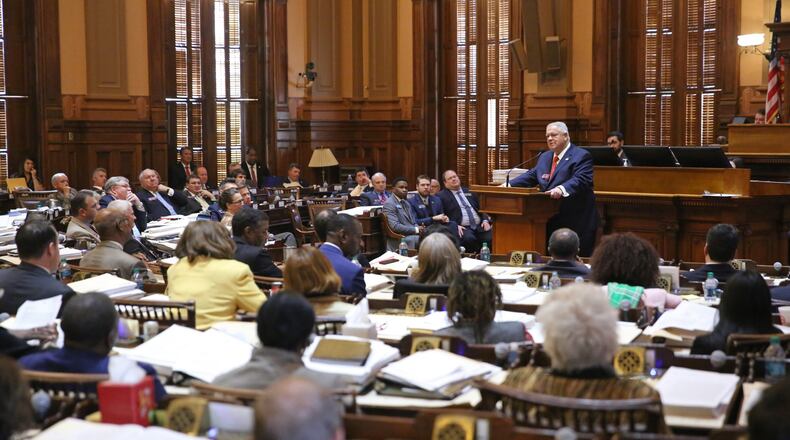Next month’s primary elections feature races for 20 open seats in the Georgia General Assembly along with challenges to several vulnerable incumbents, potentially shaking up the state’s balance of power.
All but one of the 20 seats without an incumbent are currently held by Republicans, creating an opportunity for Democrats to make inroads in the Georgia House and Senate.
Five of those departing legislators are running for higher office. The rest are quitting politics altogether, in some cases choosing to leave rather than face tough campaigns in increasingly competitive districts.
The May 22 party primaries will set the stage for a long campaign leading up to the Nov. 6 general election, when voters will choose between Republicans and Democrats to represent their districts.
All of Georgia’s 180 House seats and 56 Senate seats are up for election, along with statewide races for governor, lieutenant governor, secretary of state and others.
As in the rest of the country, Democrats are likely to gain several seats in Georgia this year, political analysts say. Midterm elections usually favor the party that’s not in power, and President Donald Trump is fueling Democrats’ hopes to whittle down the state’s Republican majority.
But even if there’s a blue wave, Republican control of most Georgia elected offices isn’t in jeopardy. Republicans hold nearly two-thirds of seats in the state Legislature, more than enough to withstand potential Democratic Party victories.
“It’s a particularly vulnerable time for Republicans right now,” said Kerwin Swint, a political scientist for Kennesaw State University. “Any time you see an open seat, that gives an opening to whoever has been the out party — the Democrats. It depends on the quality of candidates they can recruit, how much money they can raise and turnout.”
Some of the hottest races are in Atlanta’s suburbs, which are becoming less solidly Republican.
During the 2016 presidential election, voters in Cobb and Gwinnett counties supported Hillary Clinton over Trump after backing Republican Mitt Romney over Democratic President Barack Obama in 2012.
Seats coming open near Atlanta's Northside are currently held by state Rep. Buzz Brockway, R-Lawrenceville; state Rep. David Casas, R-Lilburn; state Rep. Joyce Chandler, R-Grayson; state Rep. Earl Ehrhart, R-Powder Springs; state Rep. Rich Golick, R-Smyrna; state Rep. Brad Raffensperger, R-Johns Creek; state Sen. David Shafer, R-Duluth; state Rep. Tom Taylor, R-Dunwoody; and state Rep. Wendell Willard, R-Sandy Springs.
“You don’t have to be a political scientist to know that it could be a very favorable year for Democrats in November,” said Chip Lake, a Republican strategist. “If you’re a suburban Republican, my guess is you’re going to to be in the fight of your life in November.”
Still, Democratic gains might be modest because most of those districts still lean Republican, said Fred Hicks, a Democratic political campaign consultant.
“The margin is going to shrink. We’ll pick up a handful,” Hicks said. “2020 is when we’ll see the rest of those go over.”
Democrats will have to defend three legislative seats they flipped during special elections last year. Those seats are held by state Rep. Deborah Gonzalez, D-Athens; state Sen. Jen Jordan, D-Atlanta; and state Rep. Jonathan Wallace, D-Watkinsville.
Several Republican incumbents seeking re-election aren’t safe either, though incumbents usually win.
Perhaps the most contentious primary race is between state Rep. Betty Price, R-Roswell, and former Roswell Mayor Jere Wood.
Price, whose husband is former U.S. Health and Human Services Secretary Tom Price, has been at the center of controversies in recent months over her comments about the physical appearance of Democratic women and whether to quarantine people with HIV. Wood will draw on his local ties as Roswell's mayor for 20 years after he was forced out by term limits legislation.
By the numbers
236: Seats in the Georgia General Assembly, all of which are up for election
20: Open seats created by legislators running for higher office or stepping down
121: House seats contested by Democrats, up from 82 of 180 seats in 2016. Democrats are fielding candidates in 38 of 56 Senate seats.
65%: Republican-held seats in the Legislature
Stay on top of what’s happening in Georgia government and politics at PoliticallyGeorgia.com.
About the Author
Keep Reading
The Latest
Featured






